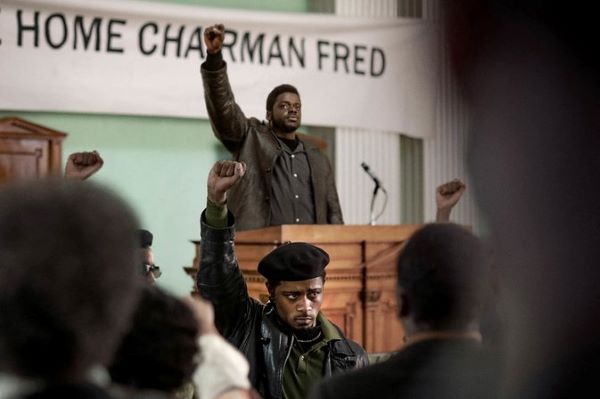Daniel Kaluuya returns to the mean streets of Chicago for a barnstorming turn as infamous Black Panther Fred Hampton. The British actor was previously seen in the Second City for scene-stealing, psychotic support in Steve McQueen‘s Widows. In Shaka King’s Judas and the Black Messiah, he dominates utterly as the furiously militant and politically savvy young chairman of the Illinois chapter of the party, first vilified, then jailed, and finally assassinated in his bed by the FBI. King’s passionate recreation of the turbulent events of 1969 occasionally lets righteous anger cloud his storytelling, but this true-life tragedy about a radical hero and the man who betrayed him is a supremely entertaining piece of firebrand filmmaking, kicking aide the normal stuffy constraints of the true-life drama with easy disdain.
When low-level criminal William O’Neal (LaKeith Stanfield) is caught impersonating an FBI agent in order to steal a car, he’s approached by the real FBI in the form of agent Roy Mitchell (Jesse Plemons). Mitchell has an offer O’Neal really can’t refuse: work as an informant against Hampton, or be face some hefty jail time. FBI director J. Edgar Hoover (a doughy Martin Sheen, falling somewhere between Steve Bannon and Silas Greenback) is terrified of Hampton’s charismatic ability to unit disparate groups – black and white – under the banner of a ‘Rainbow Coalition’, and wants O’Neal to get close to Hampton and drop him into the clutches of the FBI. It’s a plot that ultimately leads to O’Neal’s horrifying complicity in Hampton’s assassination at the age of 21.
Ostensibly, Stanfield’s O’Neal is the main character, and the audience surrogate into the dangerous, but ultimately seductive orbit of Hampton. A fine actor whose swift ascension since his bloody nose bit-part in Get Out has been well earned, Stanfield is smart enough to downplay the character and let Kaluuya dominate. After all, O’Neal’s life is on the line as much as his freedom so it’s understandable he would have to walk a tightrope between ingratiation and keeping his head down. The relationship between the two men plays like a tighter, more combustible version between that of Casey Affleck and Brad Pitt in The Assassination of Jesse James by the Coward Robert Ford.
Impressively, for all that the film’s sympathies are entirely with Hampton and his revolutionary ideals – the slimy characterisation of Hoover as a blunt case in point – it isn’t devoid of empathy for O’Neal. Given that he’s damned by the film’s very title (and a brilliant title it is), the film does just about enough to keep us in his headspace and worried about his discovery. A lot of this is down to Stanfield’s high-tensile, twitchy performance. King makes no bones about the fact that Hampton was a dangerous man – few genuine revolutionaries aren’t – and O’Neal’s growing belief in the cause, and respect for Hampton is always tempered by fear. It’s a delicate balancing act for such an otherwise blunt film, but it’s always offset by the outright villainy of the authorities, whether in the cartoonish form of Hoover, or Plemons’ blandly manipulative Mitchell.
Clearly though, Judas and the Black Messiah belongs unequivocally to Daniel Kaluuya. Hampton was an unfeasibly charismatic character, and it’s some testament to Kaluuya that he’s so convincing. Even when he isn’t on screen his spectre dominates everything. We learn little about what he was like as a man. Only through his rather sketched relationship with Deborah Johnson (Dominique Fishback) do we learn that he’s slightly bashful in person. The film is interested about him as a myth and a martyr. The title of ‘Black Messiah’ may have been bestowed upon him satirically by Hoover, but King co-opts it like the movement for civil rights have co-opted any number of slurs and pejoratives in the past. The scenes of him at the mic are the most electric of the film; emotive and eloquent in equal measure.
The film isn’t without it’s flaws. Some of the supporting characters are rather thin, and some of the action in the third act is rather confusing in terms of motivation and narrative function. However, it is an absolute rocket of a film, in terms of both impact and pace. And unusually for a film based on fact, apart from the obvious leeway taken with the characters in terms of dialogue, very little has been overtly changed or embellished for dramatic effect. Perhaps the established facts of the case need little in the way of added spice. A roaring, furious work whose canny characterisation keeps it from outright polemic, Judas and the Black Messiah, is passionate, political, and massively entertaining. A great juggling act.
Screened as part of Sundance Film Festival 2021
